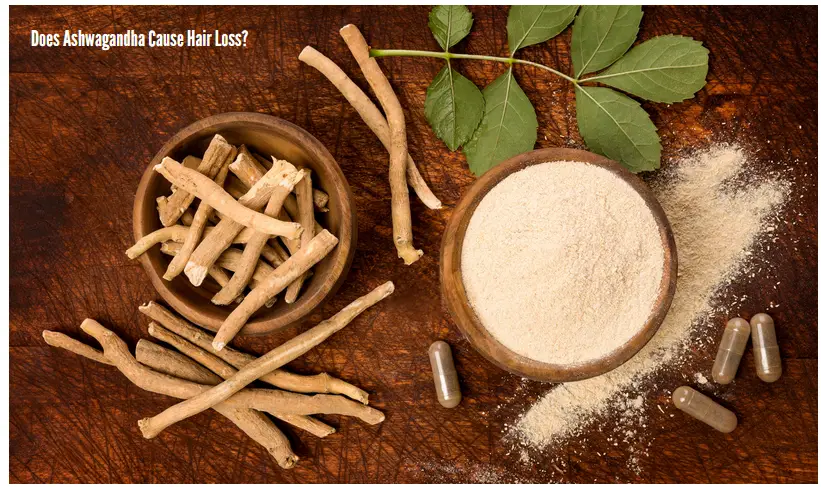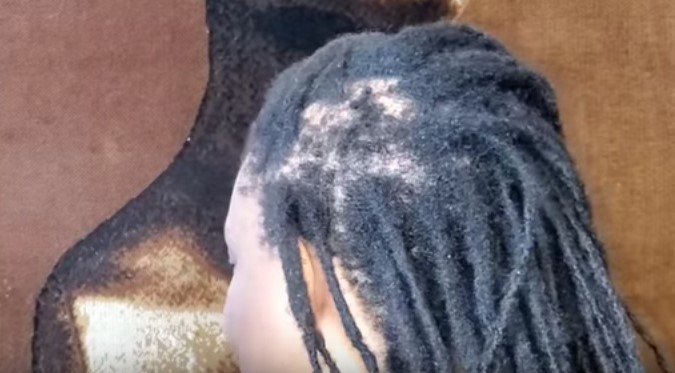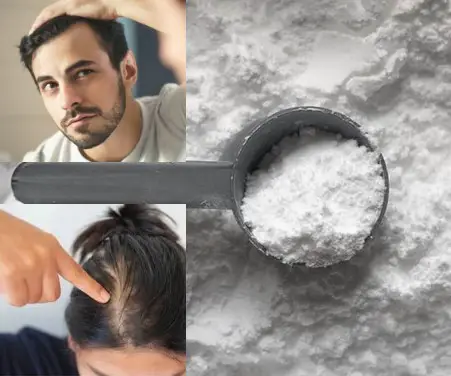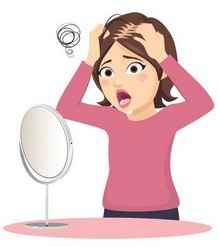Does Ashwagandha cause hair loss? Explore the effects of Ashwagandha on hair health, understand its potential benefits, and discover how supplements like Folifort and Restolin can help combat hair loss. A comprehensive guide for healthier, more vibrant hair.
In the quest for natural remedies to combat hair loss, one herb that has been making waves is Ashwagandha. This ancient medicinal herb, revered in Ayurvedic medicine for its myriad health benefits, has recently been under the spotlight for its potential effects on hair health. But the question that has been on everyone’s mind is, can ashwagandha cause hair loss?
In this comprehensive guide, we delve into the science behind Ashwagandha and its relationship with hair health. We’ll explore the claims, sift through the research, and provide you with a balanced perspective on whether Ashwagandha can indeed cause hair loss.
But that’s not all. We understand that hair loss can be a distressing experience, and finding a solution that works can often feel like a never-ending journey. That’s why we’ll also introduce you to two of our top-rated hair growth supplements, Folifort Hair Growth Supplement and Restolin Hair Growth Supplement. These natural supplements are packed with potent herbs that have been scientifically proven to promote hair growth and combat hair loss.
So, whether you’re curious about the effects of Ashwagandha on hair loss, or you’re on the lookout for a reliable hair growth supplement, this guide has got you covered. Let’s dive in!
Before we proceed, it’s worth noting that while we strive to provide accurate and up-to-date information, this article should not replace professional medical advice. Always consult with a healthcare professional before starting any new supplement regimen.
Takeaways
In our exploration of the question, “Does Ashwagandha cause hair loss?”, we’ve discovered a few key points:
- There’s no concrete scientific evidence to suggest that Ashwagandha directly causes hair loss. In fact, Ashwagandha is often used in Ayurvedic medicine to promote hair health and combat stress, a significant contributor to hair loss.
- Hair loss can be a complex issue with multiple causes, and a holistic approach that addresses the underlying causes is the most effective strategy. This includes a balanced diet, regular exercise, stress management, proper hair care practices, and the use of hair growth supplements.
- Supplements like Folifort and Restolin can be effective allies in your fight against hair loss. They are packed with potent herbs and nutrients designed to promote hair health and combat hair loss.
- Always consult with a healthcare professional before starting any new supplement regimen, especially if you have existing health conditions or are taking other medications.
Remember, the journey to healthier hair is a marathon, not a sprint. With the right approach and a little patience, you can combat hair loss and enjoy healthier, more vibrant hair.
Stay tuned as we explore more about Ashwagandha and hair loss in the next section. For more insights into natural remedies for hair loss, don’t forget to check out our article on Ayurvedic treatment for hair loss and regrowth.
What is Ashwagandha?
Ashwagandha, also known as Withania somnifera, is a medicinal herb that has been used for thousands of years in Ayurvedic medicine. It’s often referred to as the “Indian ginseng” due to its rejuvenating properties. Ashwagandha is a powerful adaptogen, meaning it helps the body manage stress and adapt to various environmental changes.

The herb is native to India, the Middle East, and parts of Africa, but its popularity has spread worldwide due to its numerous health benefits. These range from reducing anxiety and depression, improving brain function, and even boosting fertility in men. But what about its effects on hair health? Does Ashwagandha cause hair loss, or can it actually promote hair growth?
Ashwagandha is rich in antioxidants, iron, and amino acids, all of which are essential for hair health. It’s believed to increase blood circulation to the scalp, providing nourishment to hair follicles and promoting hair growth. However, the relationship between Ashwagandha and hair health is complex and still being explored by scientists.
As we delve deeper into the effects of Ashwagandha on hair loss, it’s important to remember that everyone’s body responds differently to supplements. What works for one person might not work for another. Therefore, it’s always recommended to consult with a healthcare professional before starting any new supplement regimen.
In the next section, we’ll explore the claim that Ashwagandha causes hair loss and what the research says about it. Meanwhile, if you’re interested in learning about other natural remedies for hair loss, check out our article on Minoxidil alternatives.
Does Ashwagandha Cause Hair Loss?
The question, “Does Ashwagandha cause hair loss?” has been a topic of much debate and discussion. While some anecdotal reports suggest a link between Ashwagandha and hair loss, the scientific evidence is not conclusive.
One of the main reasons for this confusion is the complex nature of hair loss itself. Hair loss can be influenced by a myriad of factors, including genetics, hormonal imbalances, stress, poor nutrition, and certain medical conditions. Therefore, it can be challenging to pinpoint a single cause, such as Ashwagandha.
However, it’s important to note that Ashwagandha is known to affect the body’s hormonal balance. It has been shown to increase the levels of thyroid hormones in some individuals. An overactive thyroid, or hyperthyroidism, can lead to hair thinning and loss. Therefore, if you have a thyroid condition or are sensitive to changes in thyroid hormone levels, it’s advisable to consult with a healthcare professional before taking Ashwagandha.
On the other hand, Ashwagandha is also known for its stress-reducing properties. Chronic stress is a common trigger for hair loss, and by helping to manage stress levels, Ashwagandha could potentially help prevent stress-induced hair loss.
In some cases, people have reported an increase in facial hair growth, particularly in women, after taking Ashwagandha. This is believed to be due to the herb’s potential effects on testosterone levels. However, more research is needed to fully understand this effect.
While there are anecdotal reports of Ashwagandha causing hair loss, the scientific evidence is not conclusive. The herb’s effects on hair health can vary greatly depending on individual factors such as hormonal balance, stress levels, and overall health.
In the next section, we’ll delve deeper into the science behind Ashwagandha and hair health. Meanwhile, if you’re experiencing hair loss and are looking for a comprehensive treatment plan, consider our Stages of Balding Treatment. This treatment plan combines the best of science and nature to help you combat hair loss effectively.
Ashwagandha and Hair Health: The Science
When it comes to Ashwagandha and hair health, the science is fascinating. Ashwagandha is rich in antioxidants, which can help protect the hair follicles from damage. It also contains amino acids, which are the building blocks of protein. Considering that hair is primarily made up of a protein called keratin, these amino acids can contribute to healthier and stronger hair.
One of the key ways Ashwagandha may benefit hair health is through its stress-reducing properties. Chronic stress can lead to a condition known as telogen effluvium, a form of temporary hair loss. By helping to manage stress levels, Ashwagandha could potentially help prevent this type of hair loss.
In addition, Ashwagandha is believed to stimulate the production of melanin, the pigment responsible for the color of your hair. This could potentially help delay the graying of hair.
However, it’s important to note that while these potential benefits are promising, more research is needed to fully understand the effects of Ashwagandha on hair health. Most of the current research is based on animal studies, and human studies are limited.
One area of concern is the potential effect of Ashwagandha on thyroid hormone levels. As mentioned earlier, Ashwagandha has been shown to increase thyroid hormone levels in some individuals, which could potentially lead to hair loss. Therefore, if you have a thyroid condition or are sensitive to changes in thyroid hormone levels, it’s advisable to consult with a healthcare professional before taking Ashwagandha.
While Ashwagandha has several potential benefits for hair health, it’s important to approach it with a balanced perspective. Always consult with a healthcare professional before starting any new supplement regimen, and remember that a holistic approach to hair health, including a balanced diet, regular exercise, and stress management, is the most effective strategy.
In the next section, we’ll explore the relationship between Ashwagandha and DHT levels, another important factor in hair health. Meanwhile, if you’re interested in learning more about natural remedies for hair loss, check out our comprehensive guide on Ayurvedic treatment for hair loss.
Ashwagandha and DHT Levels
Dihydrotestosterone (DHT) is a hormone that’s often associated with hair loss. High levels of DHT can shrink hair follicles and shorten the hair growth cycle, leading to thinning hair and eventual hair loss. This has led many to wonder about the relationship between Ashwagandha and DHT levels.
Ashwagandha is known to influence hormone levels in the body. However, the research on whether it specifically affects DHT levels is limited. Some studies suggest that Ashwagandha might increase testosterone levels, and since DHT is derived from testosterone, this could potentially lead to increased DHT levels. However, these studies are not conclusive, and more research is needed to fully understand the relationship between Ashwagandha and DHT levels.
It’s also worth noting that while high DHT levels can contribute to hair loss, they are not the only factor. Other factors, such as genetics, stress, and overall health, also play a significant role. Therefore, even if Ashwagandha does influence DHT levels, it does not necessarily mean it will lead to hair loss.
While the relationship between Ashwagandha and DHT levels is complex and not fully understood, it’s important to remember that hair health is influenced by a variety of factors. A holistic approach, including a balanced diet, regular exercise, stress management, and appropriate hair care practices, is the most effective strategy for maintaining healthy hair.
In the next section, we’ll introduce you to natural remedies for hair loss, including our top-rated hair growth supplements, Biotin gummies and Minoxidil and Biotin. Meanwhile, if you’re interested in learning more about DHT and hair loss, check out our article on DHT blockers for women.
Natural Remedies for Hair Loss

While the question “Does Ashwagandha cause hair loss?” may not have a straightforward answer, there’s no denying the power of natural remedies in promoting hair health. From essential oils to dietary changes, there are numerous natural strategies that can help combat hair loss and promote hair growth.
Here are some effective natural remedies for hair loss:
- Balanced Diet: A diet rich in vitamins, minerals, and proteins can promote hair health. Include foods rich in iron, vitamin D, B-vitamins, and omega-3 fatty acids in your diet.
- Scalp Massage: Regular scalp massages can stimulate blood circulation to the hair follicles, promoting hair growth.
- Essential Oils: Oils like rosemary, lavender, and peppermint have been shown to promote hair growth when massaged into the scalp.
- Stress Management: Chronic stress can lead to hair loss. Practices like yoga, meditation, and deep breathing can help manage stress levels.
- Herbal Supplements: Certain herbs, like Ashwagandha, Saw Palmetto, and Ginkgo Biloba, are believed to promote hair health.
While these natural remedies can be beneficial, it’s important to remember that hair loss can be a complex issue with multiple causes. Therefore, a holistic approach that addresses the underlying causes of hair loss is the most effective strategy.
In addition to these natural remedies, consider incorporating a hair growth supplement into your routine. Our top-rated supplements, Folifort and Restolin, are packed with potent herbs that have been scientifically proven to promote hair growth and combat hair loss.
In the next section, we’ll delve deeper into these supplements and how they can help you on your journey to healthier hair. Meanwhile, if you’re interested in learning more about natural remedies for hair loss, check out our comprehensive guide on herbs that stimulate hair growth.
Folifort and Restolin: Your Allies Against Hair Loss
When it comes to combating hair loss, the right supplements can make a world of difference. That’s where Folifort and Restolin come in. These top-rated hair growth supplements are packed with potent herbs and nutrients designed to promote hair health and combat hair loss.
Folifort is a powerful hair growth supplement that works by nourishing the hair follicles from within. It’s packed with vitamins, minerals, and herbal extracts that have been scientifically proven to promote hair growth. These include Biotin, Folic Acid, and a proprietary blend of natural ingredients like Saw Palmetto, Horsetail extract, and Fo-Ti. By providing the hair follicles with the nutrients they need, Folifort helps to promote healthier, thicker, and more vibrant hair.
Restolin, on the other hand, is a unique hair support supplement that works by targeting the root cause of hair loss. It contains a blend of natural ingredients, including Graviola Leaf, Red Raspberry, Green Tea, and Beta-Glucan. These ingredients work together to help balance hormone levels, reduce inflammation, and stimulate hair growth. Restolin is designed to work for both men and women, and it’s suitable for all hair types.
Both Folifort and Restolin are made in the USA in an FDA-approved facility, ensuring their quality and safety. They are also free from any harmful chemicals or synthetic additives, making them a safe and natural choice for promoting hair health.
Incorporating these supplements into your daily routine can be a game-changer in your fight against hair loss. However, remember that supplements are just one piece of the puzzle. A balanced diet, regular exercise, stress management, and proper hair care practices are also crucial for maintaining healthy hair.
While the question “Does Ashwagandha cause hair loss?” may not have a straightforward answer, there’s no denying the power of natural remedies and supplements in promoting hair health. With the right approach, you can combat hair loss and enjoy healthier, more vibrant hair.
In the next section, we’ll answer some frequently asked questions about Ashwagandha and hair loss. Meanwhile, if you’re looking for a comprehensive treatment plan for hair loss, consider our Best DHT Blocker Supplement. This treatment plan combines the best of science and nature to help you combat hair loss effectively.
FAQs: Can Ashwagandha Cause Hair Loss
In this section, we’ll answer some of the most frequently asked questions about Ashwagandha and hair loss.
-
Does Ashwagandha cause hair loss?
While some people have reported hair loss after taking Ashwagandha, there’s no scientific evidence to suggest that Ashwagandha directly causes hair loss. In fact, Ashwagandha is often used in Ayurvedic medicine to promote hair health. However, Ashwagandha can influence hormone levels, which could potentially contribute to hair loss in some individuals. If you’re concerned about hair loss, it’s advisable to consult with a healthcare professional before taking Ashwagandha.
-
Can Ashwagandha help with hair growth?
Ashwagandha is rich in antioxidants and amino acids, which can help protect the hair follicles and promote hair growth. It’s also known for its stress-reducing properties, and since stress can contribute to hair loss, Ashwagandha could potentially help prevent stress-induced hair loss.
-
How should I use Ashwagandha for hair loss?
Ashwagandha can be taken in various forms, including capsules, powder, and liquid extract. The recommended dosage can vary depending on the form and the individual’s health status, so it’s best to consult with a healthcare professional for personalized advice.
-
Are there any side effects of taking Ashwagandha?
Ashwagandha is generally considered safe for most people when taken in recommended doses. However, it can cause side effects in some individuals, including upset stomach, diarrhea, and changes in blood sugar and blood pressure levels. It can also interact with certain medications, so it’s advisable to consult with a healthcare professional before starting Ashwagandha.
-
What are some other natural remedies for hair loss?
In addition to Ashwagandha, there are numerous other natural remedies for hair loss, including a balanced diet, regular exercise, stress management, and the use of essential oils. You can also consider taking a hair growth supplement like Folifort or Restolin.
In the next section, we’ll wrap up our discussion on Ashwagandha and hair loss. Meanwhile, if you’re interested in learning more about natural remedies for hair loss, check out our article on it Really Works Vitamins.
Conclusion
In conclusion, the question “Does Ashwagandha cause hair loss?” is not as straightforward as it may seem. While some individuals have reported hair loss after taking Ashwagandha, there’s no concrete scientific evidence to suggest that Ashwagandha directly causes hair loss. In fact, Ashwagandha is often used in Ayurvedic medicine to promote hair health and combat stress, which can be a significant contributor to hair loss.
However, it’s important to remember that hair loss can be a complex issue with multiple causes, and what works for one person may not work for another. Therefore, a holistic approach that addresses the underlying causes of hair loss is the most effective strategy. This includes a balanced diet, regular exercise, stress management, proper hair care practices, and the use of hair growth supplements that specially made for female like Divine Locks and Tress Anew.
We hope this article has provided you with a deeper understanding of Ashwagandha and its potential effects on hair health. Remember, it’s always best to consult with a healthcare professional before starting any new supplement regimen, especially if you have existing health conditions or are taking other medications.
If you’re interested in learning more about natural remedies for hair loss, check out our comprehensive guide on Saw Palmetto for Hair Loss in Females. And if you’re looking for a comprehensive treatment plan for hair loss, consider our Stage 3 Hair Loss Treatment. This treatment plan combines the best of science and nature to help you combat hair loss effectively.
Thank you for reading, and here’s to healthier, more vibrant hair!
- AI Powered Bald Filter Online 2024: See Yourself with No Hair! - January 19, 2024
- Harklinikken Bad Reviews 2024: Analyzing Negative Feedbacks - January 18, 2024
- How to Get the Alex Eubank Hair | Step-By-Step Tutorial 2024 - January 18, 2024







